

Brownian motion. This is a simulation of the Brownian motion of a big particle (dust particle) that collides with a large set of smaller particles (molecules of a gas) which move with different velocities in different random directions.
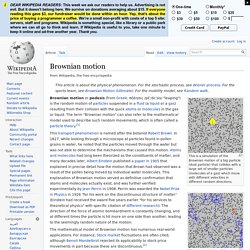
This is a simulation of the Brownian motion of 5 particles (yellow) that collide with a large set of 800 particles. The yellow particles leave 5 blue trails of random motion and one of them has a red velocity vector. Judge C. R. Magney State Park. Geography[edit] Judge C.
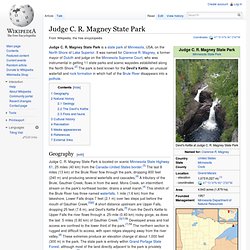
R. Magney State Park is located on scenic Minnesota State Highway 61, 25 miles (40 km) from the Canada–United States border.[3] The last 8 miles (13 km) of the Brule River flow through the park, dropping 800 feet (240 m) and producing several waterfalls and cascades.[4] A tributary of the Brule, Gauthier Creek, flows in from the west. Natural history[edit] Geology[edit] The park is underlain by alternating layers of basalt and rhyolite, which were erupted from the Midcontinent Rift System 1.1 billion years ago when the middle of the North American Plate began to crack.
Giant's kettle. The interiors of potholes tend to be smooth and regular, unlike a plunge pool.
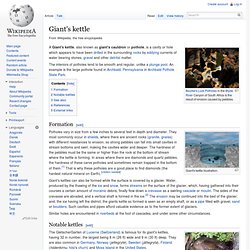
An example is the large pothole found in Archbald, Pennsylvania in Archbald Pothole State Park. Formation[edit] Giant's kettle illustration. Similar holes are encountered in riverbeds at the foot of cascades, and under some other circumstances. Notable kettles[edit] The GletscherGarten of Lucerne (Switzerland) is famous for its giant's kettles, having 32 in number, the largest being 8 m (26 ft) wide and 9 m (30 ft) deep. Ceteris paribus. Ceteris paribus or caeteris paribus is a Latin phrase meaning "with other things the same" or "all other things being equal or held constant.
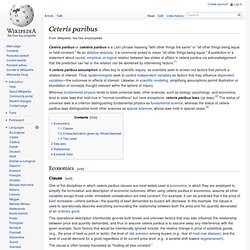
" As an ablative absolute, it is commonly posed to mean "all other things being equal. " A prediction or a statement about causal, empirical, or logical relation between two states of affairs is ceteris paribus via acknowledgement that the prediction can fail or the relation can be abolished by intervening factors.[1] A ceteris paribus assumption is often key to scientific inquiry, as scientists seek to screen out factors that perturb a relation of interest. Thus, epidemiologists seek to control independent variables as factors that may influence dependent variables—the outcomes or effects of interest. Normal good.
In particular, when the price of a normal good is zero, the demand is infinite.
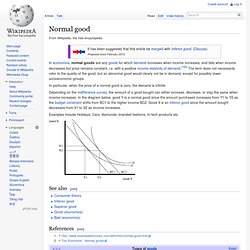
Depending on the indifference curves, the amount of a good bought can either increase, decrease, or stay the same when income increases. In the diagram below, good Y is a normal good since the amount purchased increases from Y1 to Y2 as the budget constraint shifts from BC1 to the higher income BC2. Good X is an inferior good since the amount bought decreases from X1 to X2 as income increases. Neoclassical economics. Neoclassical economics dominates microeconomics, and together with Keynesian economics forms the neoclassical synthesis which dominates mainstream economics today.[2] Although neoclassical economics has gained widespread acceptance by contemporary economists, there have been many critiques of neoclassical economics, often incorporated into newer versions of neoclassical theory.
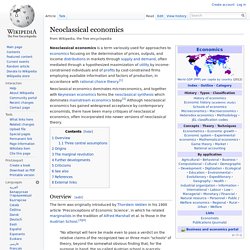
Overview[edit] The term was originally introduced by Thorstein Veblen in his 1900 article 'Preconceptions of Economic Science', in which he related marginalists in the tradition of Alfred Marshall et al. to those in the Austrian School.[3][4] Marginal cost. In economics and finance, marginal cost is the change in the total cost that arises when the quantity produced has an increment by unit.
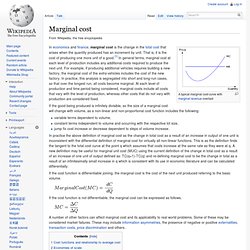
That is, it is the cost of producing one more unit of a good.[1] In general terms, marginal cost at each level of production includes any additional costs required to produce the next unit. For example, if producing additional vehicles requires building a new factory, the marginal cost of the extra vehicles includes the cost of the new factory. In practice, this analysis is segregated into short and long-run cases, so that over the longest run, all costs become marginal.
At each level of production and time period being considered, marginal costs include all costs that vary with the level of production, whereas other costs that do not vary with production are considered fixed. Inductive reasoning. Inductive reasoning (as opposed to deductive reasoning or abductive reasoning) is reasoning in which the premises seek to supply strong evidence for (not absolute proof of) the truth of the conclusion.
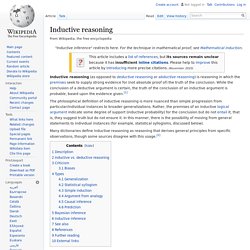
Sinkhole. A sinkhole, also known as a sink-hole,[1] sink, swallow hole, shakehole,[2] swallet or doline, is a depression or hole in the ground caused by some form of collapse of the surface layer.

Some are caused by karst processes—for example, the chemical dissolution of carbonate rocks[3] or suffosion processes.[4] Sinkholes may vary in size from 1 to 600 m (3.3 to 2,000 ft) both in diameter and depth, and vary in form from soil-lined bowls to bedrock-edged chasms. Sinkholes may be formed gradually or suddenly, and are found worldwide. The different terms for sinkholes are often used interchangeably.[5] Formation[edit] Sinkholes near the Dead Sea, formed when underground salt is dissolved by freshwater intrusion, due to continuing sea-level drop. Natural processes[edit] Sinkholes may capture surface drainage from running or standing water, but may also form in high and dry places in specific locations.
Occasionally a sinkhole may exhibit a visible opening into a cave below. Confirmation bias. Tendency of people to favor information that confirms their beliefs or values Confirmation bias, also known as myside bias, is the tendency to search for, interpret, favor, and recall information in a way that confirms or supports one's prior beliefs or values.[1] People display this bias when they select information that supports their views, ignoring contrary information, or when they interpret ambiguous evidence as supporting their existing attitudes.
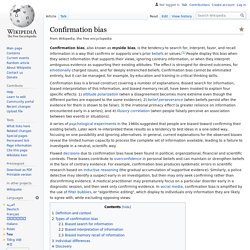
The effect is strongest for desired outcomes, for emotionally charged issues, and for deeply entrenched beliefs. Confirmation bias cannot be eliminated entirely, but it can be managed, for example, by education and training in critical thinking skills. Confirmation bias is a broad construct covering a number of explanations. A series of psychological experiments in the 1960s suggested that people are biased toward confirming their existing beliefs. Definition and context[edit] Confirmation biases are effects in information processing.
Mercantilism. Building overseas colonies;Forbidding colonies to trade with other nations;Monopolizing markets with staple ports;Banning the export of gold and silver, even for payments;Forbidding trade to be carried in foreign ships;Export subsidies;Promoting manufacturing with research or direct subsidies;Limiting wages;Maximizing the use of domestic resources;Restricting domestic consumption with non-tariff barriers to trade. The term "mercantile system" was used by its foremost critic Adam Smith,[3] but "mercantilism" had been used earlier by Mirabeau.